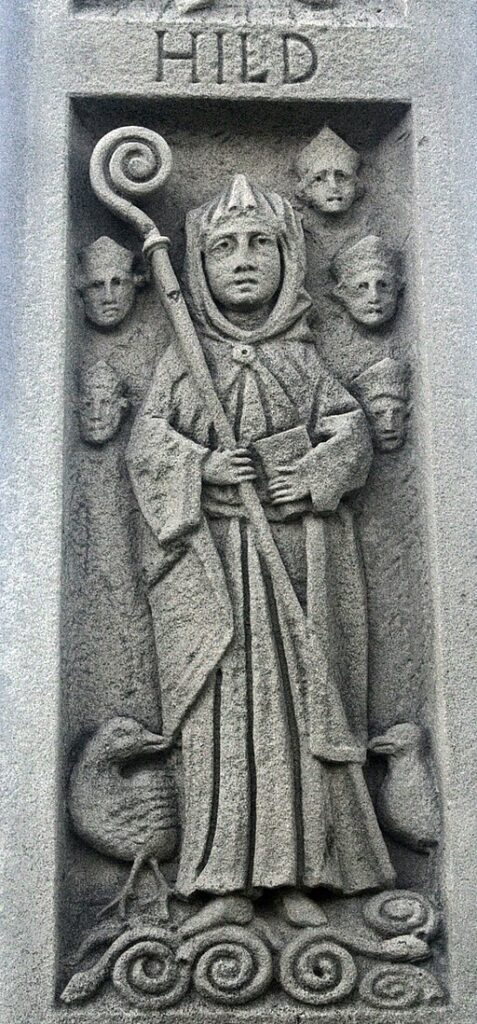Feast Day: November 17
“Every tree is known by its own fruit. For people do not pick figs from thorn bushes, nor do they gather grapes from brambles” (Lk 6:44). So Jesus said. The Church is built by saints who labor slowly, growing communities or institutions bit by bit like saplings inching skyward over the years. Many of God’s humble gardeners and arborists will likely go to their rest unrecognized by the outside word though receiving a fantastic parade in heaven. Saints like that live among us today. Today’s saint falls into that type. We, however, do remember her almost fourteen centuries later thanks to two holy men nourished by the fruit that St. Hilda of Whitby cultivated.
An Exiled Princess Returns Home
Like my two previous posts, on Edward the Confessor and Margaret of Scotland, this is the story of troubled English royalty. Hilda lived in the 600s, four centuries before Edward and Margaret, at a time when a dozen petty kingdoms ruled Britain. She grew up in the court of her uncle, King Edwin, a Christian convert who secured control over northern England. When Edwin died in battle, Hilda fled into exile in a southern English kingdom. She planned to join her sister after a time in a nunnery in France. Then she received a message from her homeland.

Stability had been restored to northern England and Christian missionaries, led by the great and gentle Irishman St. Aidan, once again had begun to work among the pagan people. Bishop Aidan needed helpers and invited the princess to join him. Hilda agreed. She came north and established a double monastery for men and women. Within a few years, her growing foundation moved to the North Sea village of Whitby.
According to the Venerable Bede, a saintly monk and historian who lived in the region a generation later, everyone who knew her called her “Mother.” Her wisdom, devotion to God, humble care for her community, and just leadership inspired all those around her. Aidan and his successor chose five holy men from her community as bishops as the young English church expanded. Many of Bede’s sources for his landmark history of Britain came from her monks and nuns, including the first written life of Pope Gregory the Great. When the king called a local synod to decide between Roman and Irish customs for calculating the date of Easter, they met at Whitby. Hilda herself had favored the Irish tradition but humbly accepted the synod’s decision in favor of the universal Roman method.
Hilda labored for thirty-three years before her death. The slow work of a lifetime planted seeds of faith that would continue to blossom and inspire future saints, like Bede. When she died, angels escorted her to her beloved Lord (as visions recorded by Bede attest).
Caedmon’s Call
Perhaps the most remarkable new shoot from her foundation was Caedmon, one of the older lay workers who tended the abbey’s fields and animals. He couldn’t carry a tune to save his life, which isolated him in a pre-media society where people had to make their own entertainment. When the community gathered to eat and drink, inevitably they would start to pass a harp around and inevitably Caedmon would quietly slip out to watch the animals before he had to face the embarrassment of his turn to entertain.
One such night, after he had left the warm and noisy human company for his solitude, a man suddenly appeared beside him and bade him sing. The confused Caedmon protested, but the stranger insisted.
“Of what then shall I sing?” said Caedmon, giving into the odd rhythm of the moment.
“Sing of God’s Creation,” said the stranger.
Caedmon’s voice and creativity suddenly spilled out together in beautiful, original song.
“Nu we sculon herigean heonrices weard
meotodes meahte ond his modgeþanc…”
“Let us now praise Heaven’s Guardian,
The mighty planner and the thoughts of His mind…”
Bede, Historia Ecclesiastica 4.24, translation from Old English by Dr. Eric
God had created His first composer of English hymns through a singular grace. When Hilda learned of these events, she called Caedmon and read scripture to him. He immediately turned it into song in accord with both the exacting dictates of Anglo-Saxon poetic tradition and deep spiritual insight. For the rest of Caedmon’s life, the monks educated him and sponsored his hymn-writing. So God’s word spread to the song-loving English. Bede only wrote down the first stanza of Caedmon’s first hymn, assuming that his audience would know and love the rest of Caedmon’s work. Caedmon’s hymns bore much good fruit, but today that lone stanza is all that survives of the first English songs of God.

Juliet220. Wikimedia Commons CC 3.0.
Singing Eternity with St. Hilda and Caedmon
The ruins of Whitby abbey sit on fields that fall in sharp cliffs into the North Sea’s waves. Beauty and desolation pull at each other in a tug of war. The ruins don’t belong to Hilda’s foundation. Vikings destroyed that around 870. Normans refounded the abbey then the English themselves destroyed it during Henry VIII’s Protestant Reformation. Like Caedmon’s songs, the immediate fruits of her labor have long decayed.
Only God is eternal. Our work never is. That’s okay. A kind word or joyful song disappears in a second, although its impression may be recorded, but it brings goodness into the world in that brief moment. Bede recorded Hilda’s work; most women and men of her type don’t have a Bede to write of them, but that doesn’t change the value of what they have done. A brief flowering or a harvest of fruit after long labor still brings joy to people whom God has loved. That is worth every moment of work.
St. Hilda, pray for me that I may labor for others and nurture them, even if it is an effort that may not seem to make a difference for years. Let me not be discouraged. Let me trust that, if I am rooted in Him, the Lord will bring forth good fruit that will nourish His people. Amen.



I deeply enjoyed this story about Caedmon. It is another wonderful example of how God can choose the least (expected) among us to carry out His work in the most beautiful of ways. Suddenly, the words of a well known prayer ring so true…
Lord, make me an instrument of Your peace…